×
The Standard e-Paper
Smart Minds Choose Us

Nine years ago, Ms Cathy Muringo was left with only Sh2,000 after her salon business failed. She felt hopeless and devastated.
A friend advised her to venture into mitumba business. That is where she put her money.